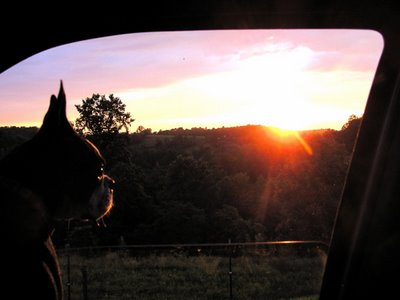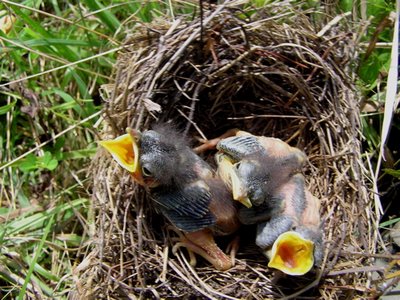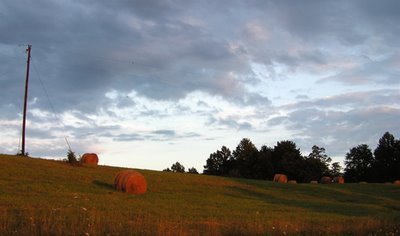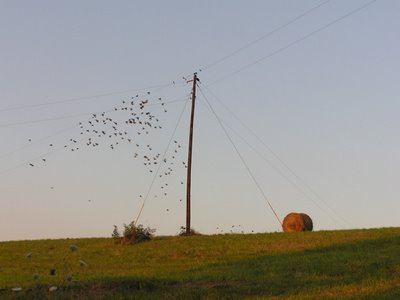
Chet kept me company as I walked out to check the bluebird boxes, and drove over to Stanleyville Road to look for a possible foster box. How I love taking him along! The sunset was breathtaking.
It appears, as of Saturday evening, that three of the four active bluebird nests remaining in boxes on our property are abandoned. Two sit, with three cold eggs each, never even incubated. The eggs are beautiful, shiny and blue. A third has week-old chicks in it, four of them. The chicks were standing up, shrilling with hunger, when I opened the box Saturday evening. You never want to see this in week-old chicks. At that age, bluebirds know they're bluebirds, and they know you are not-bluebird. The proper response to having their box opened is to hunker down, eyes screwed shut. Unless they are starving.

In the nest cup was a giant cicada, well mashed, far too large to be swallowed. I sniffed it--still fresh. Good. And a fresh, still-moist and writhing earthworm. You never want to see either of those in a bluebird nest. Earthworms may be beloved by robins, but bluebirds disdain them unless they have no other alternative. Earthworms and too-large cicadas are the foods of desperation, of starvation.
I walked back to the house, got my tweezers, mealworms, and a jar lid to tape to the box roof. I trudged back out to the end of the meadow and fed each shrilling chick eight or more mealworms. They were growing cool to the touch, and had trouble swallowing. Not good. Their skin was wrinkled and yellowish--a sign of dehydration. Three voided small fecal sacs, one with blackberries in it. Again, a sign of insufficient food. Fruit has little protein for growing nestlings; it shouldn't even be part of the diet before the babies are about ten days old. They had been fed today, but when? There were no fecal sacs in the nest. So they'd been tended fairly recently. I took heart at the live earthworm. Someone was still trying to keep them alive.
I left the rest of the mealworms in a jar lid taped to the top of the box for the parents to find, if parents there still be. In all the time I spent there, not a single bluebird appeared, and I heard not the slightest twitter, even as I sat on the ground with the brood in my lap, stuffing the peeping chicks with food. This should normally evoke a storm of protest from the parents, chittering and swooping. Nothing.
I looked through my notebook. I had only one box, on Stanleyville Road, that might just have same-age chicks inside. If these were still starving in the morning, my only choice would be to take them there. First, to drive over tonight and see if the Stanleyville nest is viable, and if the chicks are indeed the same age. There would be three. I could add these four, for a large but not impossible brood of seven. I crossed my fingers and said a prayer. I don't want to raise these bluebirds. I don't do rehab for fun. I do it because the alternative--turning my head-- is something I can't do.
I thought about the abandoned nests as I trudged back and forth up the quarter-mile-long meadow. The two clutches of eggs left cold, and this brood of four young left unfed, bespoke dead bluebirds to me. Perhaps there's a sharp-shinned hawk in the area, picking them off. Bluebirds and other wild things don't just up and abandon their families for no good reason. That's the sad, and sole, province of the angel-beast.
I drove over to Stanleyville Road as night fell. The nest that should have had week-old young in it stood empty. Its beautiful 24" x 7" stovepipe baffle had been breached. The nest was undisturbed--not pulled out of the hole as it would have been had a mammalian predator climbed up. Only a snake or another bird removes the young cleanly, surgically. Since there was no foreign nesting material added, as there would be had a house sparrow or wren done the job, I decided it must have been a giant black rat snake. Damn the luck. I climbed back in the car and headed home, despondent. I do not want to be a bluebird mother for the rest of the summer. Neither do I want the four to die.
I awoke before dawn Sunday and lay there, waiting until it was light enough to pull on my rubber boots, arm myself with mealworms and tweezers, and walk back out to the troubled nest. There was a tiny peep from the box as I approached, and a female bluebird burst out of the hole. The babies were warm; no fecal sacs littered the nest. Some of the mealworms I'd left on the roof the night before were still in the bowl, but I think some had been taken, too. I replenished them and closed the box, flooded with relief that, once again, the bird fairy had tapped me on the shoulder, and sent me out to the box in time to save this brood.
I went out again Sunday afternoon to check on the nestlings. Unsurprisingly, one had died, but the other three looked much better. The nest was clean, but for another cicada. I fed them--they weren't all that hungry--cleaned the nest of a good load of parasitic blowfly larvae, and left more mealworms on the roof. I'm beginning to suspect that the male bluebird has been killed, or has left the territory because he was having trouble finding enough food for himself and his brood. I'm telling you all this because I think you'll find it interesting. I do. I never stop gathering information, synthesizing it, trying to build a picture of what might be going on with these birds. After 25 years of monitoring bluebird boxes, I have learned enough to know when something is amiss. The signs can be as obvious as shrilling nestlings, or as subtle as an earthworm in the nest cup.
 Birds are already massing for migration: robins, barn swallows, red-winged blackbirds, starlings. They gather in flocks on the wires. The signs of autumn come too early to those who watch birds.
Birds are already massing for migration: robins, barn swallows, red-winged blackbirds, starlings. They gather in flocks on the wires. The signs of autumn come too early to those who watch birds.






0 comments:
Post a Comment